Disclosure: Meeple Mountain received a free copy of this product in exchange for an honest, unbiased review. This review is not intended to be an endorsement.
I’ve never been so joyfully afraid as the day I sat down to explore the fully decked out Big Orange Box (which I will affectionately call the B.O.B.). Now I know they only called it the Big Box, but I can’t think of a rational reason to leave out the orange from my box.
Why was I afraid, you ask?
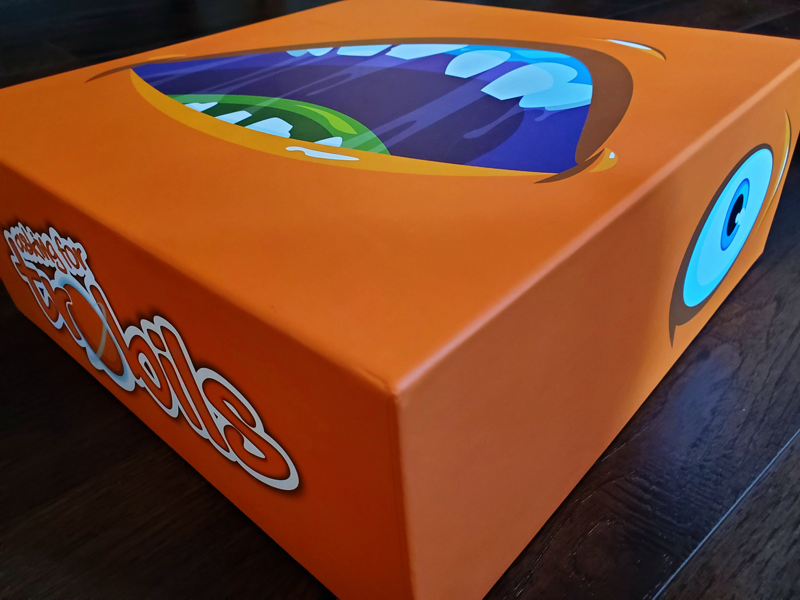
Any time a game is a hit in the household, I worry about doing anything to ruin the magic. Asking for Trobils is a rare game in that the four-year-old begs for it and the adults don’t mind indulging. She doesn’t win, but she’s competitive, and we all have fun.
The folks at Breaking Games have introduced two expansions to the mix, stretching the limits of the Trobil-verse. I will be taking time to discuss each expansion and offer a word about that B.O.B. as well as all the goodies inside. If you would like to learn more about the base game, check out my review for Asking for Trobils.
Trobil Makers
Asking for Trobils: Trobil Makers begins when the Trobots go bad. Trobots were invented to assist in the elimination of those space pests, but they turned on everyone and became part of the problem. Now they, too, must be hunted. Six different types of Trobot tokens begin in a bag—you’ll never guess the color.
Every time a player picks up their ship(s), they pull a number of Trobots from the bag (it’s orange) and place it according to the location depicted on the back. Trobots gather in five locations on the board.
When players visit locations with Trobots, they can spend one orange crystal, plus one orange crystal for each Trobot they wish to capture, before interacting with the location. In addition, each location with Trobots holds a deck of bonus cards that grant single-use abilities and/or endgame bonuses.
Players then take the Trobot tokens to the Sagan Colony, a new location that rides the circumference of the game board. Here the Trobots can be traded in for cards worth beaucoup points in the endgame—equal to and occasionally greater than those on the Trobils. On top of that, visits to the Sagan Colony grant upgrade tokens that double the reward for utilizing the Connections that beef up the ships’ functions around the board. The cards from the Sagan Colony also serve as an endgame trigger should they all disappear.
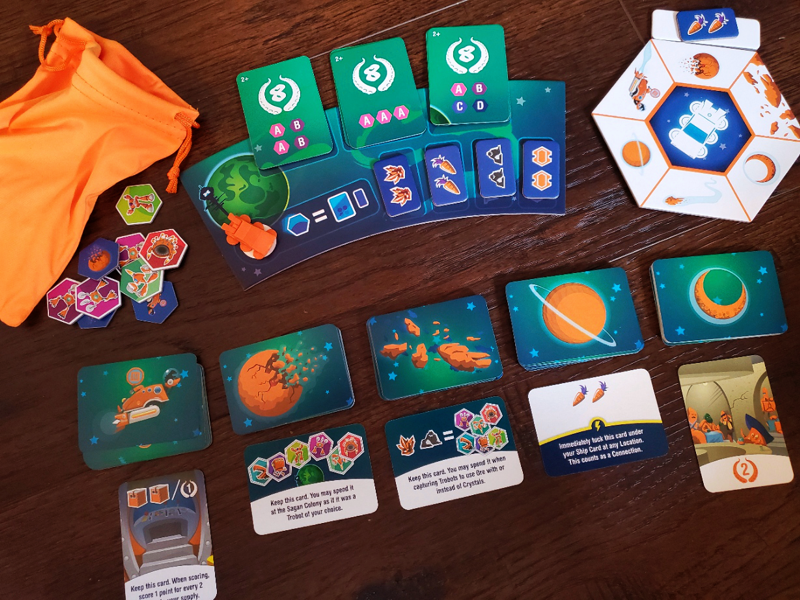
Thoughts on Trobil Makers
Trobil Makers proved my fears to be valid. On the surface, I love the idea of introducing a draw to the underserved locations around the board. I am also a fan of showing some love to the orange crystal, which is only marginally utilized in the base game. I kinda like the story of the Trobots too!
But I also have some concerns, both ultimately related to time.
Trobil Makers made the game quite fidgety when it comes to handling the components. Considering every other turn in the first several rounds involves picking up ships for most players, the early game is spent passing the bag around to pick out tokens, flip them over, and place them on the board. What was essentially a lightning-fast non-turn of picking up ships became, well, a turn that felt like extra work.
In addition, the Sagan Colony is pretty potent, which makes it a draw throughout the game. The difficulty here is that—in a four player game, for example—there are fifteen cards in the Sagan Colony that serve as one endgame trigger should they all go. But the Trobil deck, the game’s normal trigger, remains the same size. Folks aren’t going to ignore the Sagan Colony, so that just means chasing another ten or more cards before the game ends.
Between the constant bag handling and the inevitable extra turns, Trobil Makers pushes the game towards a length that doesn’t match its playful tone and lightweight decision-making. Asking For Trobils is a very tactile game, but spending this much time caught up in a storm of small movements becomes tedious at the 90-minute mark. As a result, our youngest haven’t shown much interest in going back to the Trobots, and the adults are OK with that.
I won’t say the concept is bad, but it clutters the already busy board and ties the already busy hands. I have to believe there is a way to streamline the concept to make it fit, but it’ll have to come by house rules aimed at expediency if we’re to keep it in the rotation.
Companions
Because we jumped into the Trobots first, we were really worried about Asking For Trobils: Companions. We weren’t worried for long. Companions is a more seamless addition to the base game. The centerpiece is a Dial board that holds two cards—a Companion and a Shard. These cards interact to unleash fascinating changes and restrictions upon the players.
The Companion cards feature Quirks—temporary rule modifications that come as a result of picking up new friends. The Quirks may allow for offbeat trades, restrict collection of certain resources, or the like. Most endearing, the Companions amplify the punny nods to pop culture that gave personality to the RiffRaff of the base game.
The Shard cards pair with the Companion to set the terms of their strengths and weaknesses. The Shards indicate the location or action that will grant a Shard—the new purple gem resource. The Shards are then collected on the card in groupings that unleash special bonuses, provided the group is complete and the Companion is dropped off at their preferred location. For the impatient or the inconvenienced, Companions can be simply dumped anywhere for their collected Shards, but without the bonus effects.
Companions also adds a new location to the circumference of the base board, but with a twist. Ships need not remain at the Friend Ship Board. Instead, they simply bump back to their owner at the end of the turn. This keeps the new friends accessible and inviting. The three sets have a sliding value, requiring a resource payment to bypass the first or second available choices.
Finally, Companions comes with a new Trobils deck that includes Shards among the resources required to eliminate the pests. In addition to the original style, certain cards are Shard-only Trobils. Others yet give the choice of using the normal resources or a number of Shards. Endgame triggers stay the same, with Shards also being counted as the game’s only resource that scores apart from the City cards.
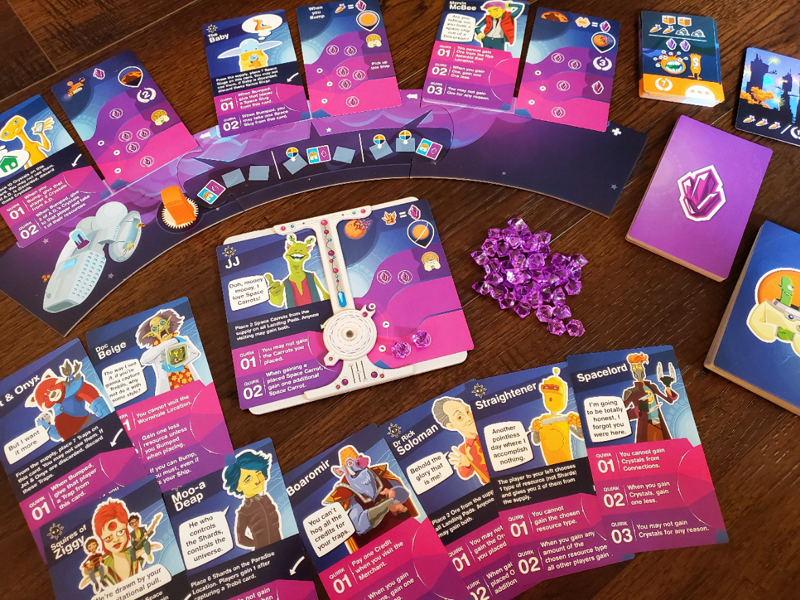
Thoughts on Companions
Companions is definitely the more polished expansion of the two. Because of the integrated Trobils deck, the game length hardly changed, even with the introduction of a new resource. Better yet, the Companions are fun and add a layer of interest to the personality that makes the base game a treat. Riffs on the MCU, Star Wars, Star Trek, X-Files, and more mean that every flip of a new Companion feels like greeting an irrationally loved imaginary friend. It’s perfect!
Making the Friend Ship Board location a temporary pit stop was also a brilliant move in keeping the game moving. I never hesitate to grab a new Companion, because I know it won’t cost me another turn to pick up the ship.
There is a lovely balance to the Shard gem. Sometimes it is necessary. Sometimes it is completely unnecessary. Sometimes it is an option. This leaves the decision space around the Companions quite flexible, holding the base game intact while providing a goofy left turn for anyone interested. The Shard gems are worth a point each at the end of the game, meaning they can even serve as little more than an entertaining bonus if that’s where players choose to leave them.
I wouldn’t call either of the two expansions necessary, but I believe Companions will see the table frequently moving forward. It might add a few minutes to the setup and a few more to the game, but the minutes ooze with parody and charm. The charm might slip over our four-year-old’s head, but the mechanics make perfect sense.
The B.(O.)B.
As for the Big Box and the glorious contents therein, I have to say I’m impressed. The box itself is gorgeous, a beautiful Trobil on the shelf that adequately holds the full base game in the bottom half with room for the two expansion boxes to sit on top. This is the kind of box you want staring out at you from the shelf.
The ship count more than doubles inside, giving players a fascinating and engaging choice at the start of every game. Should I go with the almost-Tardis, the semi-Millenium Falcon, or the definitely-not-copyright-infringement-becuase-it’s-a-parody-Delorian? There are so many iconic ships in the fray that give each game its own flair.
The metal coins are magnificent, a fine upgrade to the cardboard originals. They are lightweight but fit the aesthetic of the game so very well. The addition of the ten coin just gives obsessive players the ability to change out even more coins repeatedly, enhancing those tactile joys.
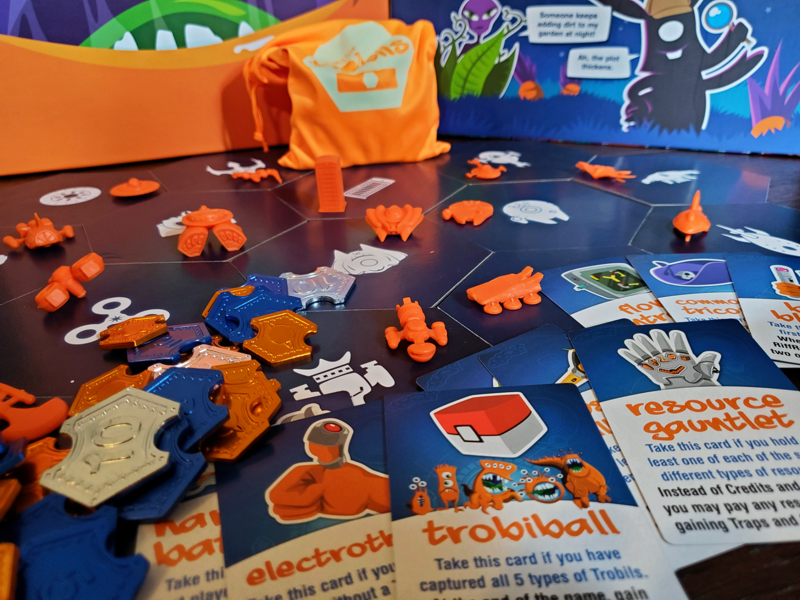
The Achievement cards are a lovely module as well, granting a specific ability to players who are the first to tackle certain relatively normal objectives within the game. They fit with any iteration of the Trobils world, a non-essential but welcome perk.
Overall, this deluxified bundle that accompanied the most recent Kickstarter is a home run. It is chock full of treasures that any fan of the game will appreciate.
Parting thoughts
I believe Asking For Trobils is something of a delicate balance of simple mechanics, charming personality, and wide appeal. There is no doubt the expansion materials tinker with that balance. The best expansions find a way to give and take without upsetting the apple cart.
I think our friends at Breaking Games pulled it off with Companions, changing out the all-important Trobil deck to accommodate the new materials. I’m not so sure about Trobil Makers, where it’s all give without an iota of take.
But that orange box? It’s the finest reminder of the absurdly endearing world Christian Strain and Erin McDonald created, and the pests we’ve come to love.


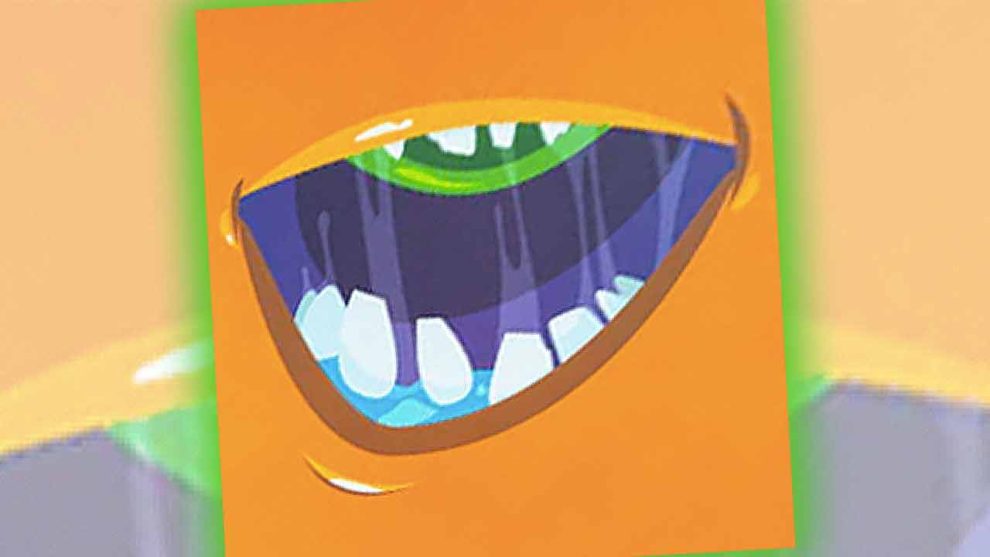


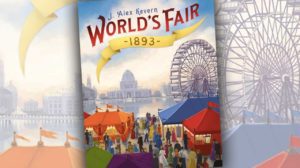
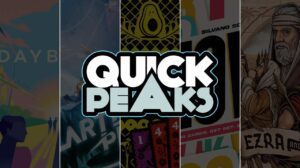




Add Comment